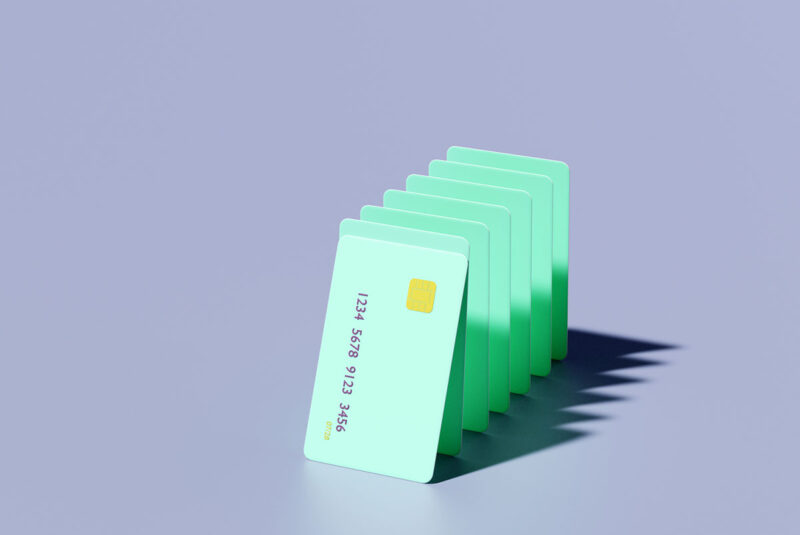Ready to expand your business with a line of credit? Or earn a massive signup bonus, thanks to your side hustle?
In this article, we cover:
- Who can apply for business credit cards
- Their pros, cons, and effect on your credit
- The application process
- Why you might want a business card even if you have a super small business (cough, signup bonuses, cough)
Whether you’re an aspiring biz mogul or a seasoned entrepreneur, you’re going to want to keep reading.
Before we get into the nitty-gritty details, however, here are a few of our favorite business credit cards.
- Capital One Spark Cash Plus
- The Business Platinum Card® from American Express
- Ink Business Preferred® Credit Card
- Ink Business Cash® Credit Card
- Capital One Spark Classic for Business
- Wells Fargo® Business Secured Credit Card
Who Can Apply for Business Credit Cards?
As you might expect, you must have some sort of business to qualify for a business credit card. If you’re already a small business owner, feel free to skip to the next section.
But if you’re mostly interested in business credit cards for the signup bonuses, you might be wondering whether you, too, could qualify.
Luckily, the definition of “business” is pretty lax. Think back to the past year: Did you hawk jewelry at the local craft fair? Did you do any freelance web design work? Did you sell your old lawnmower on Craigslist?
Any of those activities count as business revenue and could help you land a small business card. If your business hasn’t built business credit yet, don’t worry. Most banks look at your personal credit reports when you apply for a business card unless your business has already established a credit history (even then, they may still check your personal credit too).
Insider tip
Business cards may suit some freelancers, while others may prefer personal cards or a combination of the two. Explore our list of the best freelance credit cards for help deciding what works best for you.
When you visit MoneyTips, we want you to know that you can trust what’s in front of you. We are an authoritative source of accurate and relevant financial guidance. When MoneyTips content contains a link to partner or sponsor affiliated content, we’ll clearly indicate where that happens. Any opinions, analyses, reviews or recommendations expressed in our content are of the author alone, and have not been reviewed, approved or otherwise endorsed by the advertiser.
We make every effort to provide up-to-date information; however, we do not guarantee the accuracy of the information presented. Consumers should verify terms and conditions with the institution providing the products. Some articles may contain sponsored content, content about affiliated entities or content about clients in the network. While reasonable efforts are made to maintain accurate information, the information is presented without warranty.
How Do You Apply for a Business Credit Card?
If you’ve applied for a personal credit card before, the business credit card application won’t look all that different. It’ll just have some additional fields with questions about your business on top of the usual personal information.
Typically, here’s what you’ll need to provide:
- Business name: If you have a corporation, LLC, or DBA, use your business name. If you have a sole proprietorship, use your name.
- Tax Identification Number: You’ll need to provide your Social Security number (SSN), Employer Identification Number (EIN), or both. Though you don’t need an EIN to apply for a business card, they’re free to obtain — and allow you to fill out tax forms and contracts without sharing your SSN.
- Business type or your role: Select the category that best fits your business, and then write a title that describes your role (founder, owner, CEO, etc.).
- Contact information: If you have a home-based business, you can use your personal contact (email, phone number, etc.) info here.
- Years in business and number of employees: Just starting out? Put zero for years in business, and one for the number of employees.
- Annual business revenue: While it can be tempting to exaggerate this number, don’t. Honesty is always the best policy — and banks sometimes ask for paperwork to verify your numbers. You’ll likely include your personal income on your application, too, and if that and your personal credit scores are strong, you have a solid chance of getting approved.
- Estimated monthly spend: How much you plan to spend on the credit card each month.
You’ll also need to provide standard information about yourself, like your personal income and maybe your monthly housing payment.
If your application is denied, don’t hesitate to call the card issuer’s reconsideration line. Explain you want the card to help you grow your business and earn points or cash back rewards, and you may luck out with a sympathetic rep who approves your application.
3 Different Types of Business Credit Cards
The most common types of business cards are as follows.
Business Credit Cards
These are similar to regular personal credit cards: They have a credit limit that dictates how much you can spend on the card before paying it off.
You must make a minimum payment each billing cycle, but you don’t have to pay your bill in full, and can carry a balance from month to month.
While we don’t recommend carrying a balance because it’ll incur high interest charges, doing so can provide small business owners with a financial cushion during lean months.
Business Charge Cards
Unlike credit cards, charge cards don’t have a published credit limit. Instead, they have “shadow” limits, which tend to be higher and more flexible than credit card limits. These limits can change over time, depending on your use of the card, credit history, and financial situation — and going over them could freeze your account.
Another big difference with charge cards: You can’t carry a balance, and you must pay your bill in full each month.
These cards can be useful for businesses whose expenses vary greatly but can be dangerous if you spend more than you can pay off. Not paying the full balance could lead to penalty fees, as well as the inability to make more purchases.
On the other hand, if you need extra motivation to only spend what you can afford, a charge card could be the push you need.
Secured Business Credit Cards
If you’re a business owner with low or no personal credit, a secured credit card might be your only option. With these cards, you put down a deposit (say, $2,000) that serves as your credit line.
Since payments are usually reported to the credit bureaus, they’re a good way to build business credit until you qualify for an unsecured card.
Pros and Cons of Business Credit Cards
If you’re a small business owner, the main purpose of business credit cards is to separate your personal expenses from your business expenses.
Without a dedicated business card, you’ll spend the end of the year ripping your hair out while determining which of your 112 Amazon charges are business purchases. (Not that I know from experience or anything…)
Here are the other pros and cons of using business credit cards.
Pros of Business Credit Cards
- Earn extra rewards and signup bonuses on common business purchases
- Take advantage of charge cards without credit limits, or 0% intro APRs while getting started
- Smooth out cash flow and have a financial fallback
- Build business credit, in case you want to take out a loan in the future
- Get cards for your employees (and collect the points earned by their purchases)
- Avoid high personal credit utilization from business purchases (as long as you’re responsible for them, business credit cards don’t usually show up on your personal credit reports)
Cons of Business Credit Cards
- Might pay a high annual fee
- Personal liability for business charges (more on this below)
- Could negatively affect your personal credit scores (more on this below)
While many business credit cards come with high credit limits, they often come with high interest rates, too. Though you can use your credit card to loan yourself money in a pinch, we always recommend paying your bill in full each month, so you can avoid paying interest completely.
Also worth noting: The CARD Act of 2009, which protects consumers from retroactive rate increases and fees, doesn’t apply to business cards. That being said, many business cards still offer these guarantees — so be sure to read the fine print.
Another Smart Reason to Apply for Business Credit Cards
For true rewards credit card junkies, there may come a time when you’ve taken advantage of many of the signup bonuses on the market.
But applying for business credit cards opens up a whole new world of killer signup bonuses.
Take the Ink Business Preferred® Credit Card, for example. It’ll give you 100,000 bonus points for spending $15,000 in the first 3 months after account opening.
So, even if your business is teeny tiny, you should consider applying for business credit cards. Just be sure to embrace responsible credit use: Pay your bill in full each month, and never spend extra money to get rewards.
How Do Your Credit Scores Affect Business Credit Card Applications?
Did you know businesses have credit scores, too?
Three credit bureaus — Dun & Bradstreet, Equifax, and Experian — offer business credit scores on a scale from 0 to 100. But if you’re just starting out, you won’t have any business credit yet. This means that even when you’re applying for a business card, credit card companies will look at your personal credit scores.
Just like with personal credit cards, the card issuer will pull your credit reports after you apply. It’ll want to see things like solid payment history, low credit utilization ratio, and long average age of accounts.
Since each application results in a hard credit check, you should only apply for cards that match your creditworthiness. (Here’s how to check your FICO score for free.) If you’re worried you won’t get approved for a card, try applying to a bank or credit union with which you already have a relationship. That said, a few hard inquiries won’t have a significant impact on your scores, especially if you have good credit, so don’t be afraid to apply for a card if you really want it.
When you apply for a business credit card, note you’ll probably have to sign a “personal guarantee.” This means you take personal responsibility for any debts incurred — and if the business fails and you’re unable to pay your bills, the bank can come after your personal finances. If you have a well-established business, however, you may be able to negotiate with the credit card issuer to get a business card without a personal guarantee.
How Do Business Credit Cards Affect Personal Credit Scores?
Once you’re approved, your business card activities generally won’t affect your personal credit scores.
Out of the major credit card issuers, only Capital One reports all business credit card activity to the personal credit bureaus: TransUnion, Equifax, and Experian. So all the activity will wind up on your personal credit reports. American Express, Chase, and U.S. Bank only report negative information and delinquencies.
That doesn’t mean you should be irresponsible, though; missing payments could cause you to incur late fees and interest charges — and delinquencies could eventually impact your personal credit history.
The Best Business Credit Cards
Ready to apply for your business credit card? Amidst all the shiny card offers out there, it can be hard to know which to choose.
In addition to finding a card that matches your credit scores, here are a few things to consider:
- Intro APR: If you’re just starting out in your new business, a 0% introductory APR can be very attractive. Many small business credit cards offer this for a year (or more), which means you won’t pay interest while you’re getting your business off the ground. While this can give you some room to breathe, you should strive to pay off the balance before the intro period ends.
- Rewards: Most business cards have rewards programs that let cardholders earn miles, cash back, or rewards points you can redeem for statement credits, travel expenses, or gift cards. Find a card that awards extra points wherever you shop most, whether it’s gas stations, car rental agencies, or office supply stores.
- Signup bonus: Speaking of rewards, you might as well earn a nice signup bonus with your new rewards card. Look for one you can achieve without spending more money than you normally would, and check out some suggestions for meeting minimum spend requirements.
- Fees: Take a look at the annual fees associated with your card, and make sure the rewards are worth it. If you often travel abroad for work — or purchase supplies in a different currency — choose a card without foreign transaction fees.
- Other benefits: Many cards offer purchase protections, expense tracking, travel insurance, and other perks that save time and money. You should also look for cards that allow you to request employee cards to control business spending across the company, and that integrate with your accounting software.



